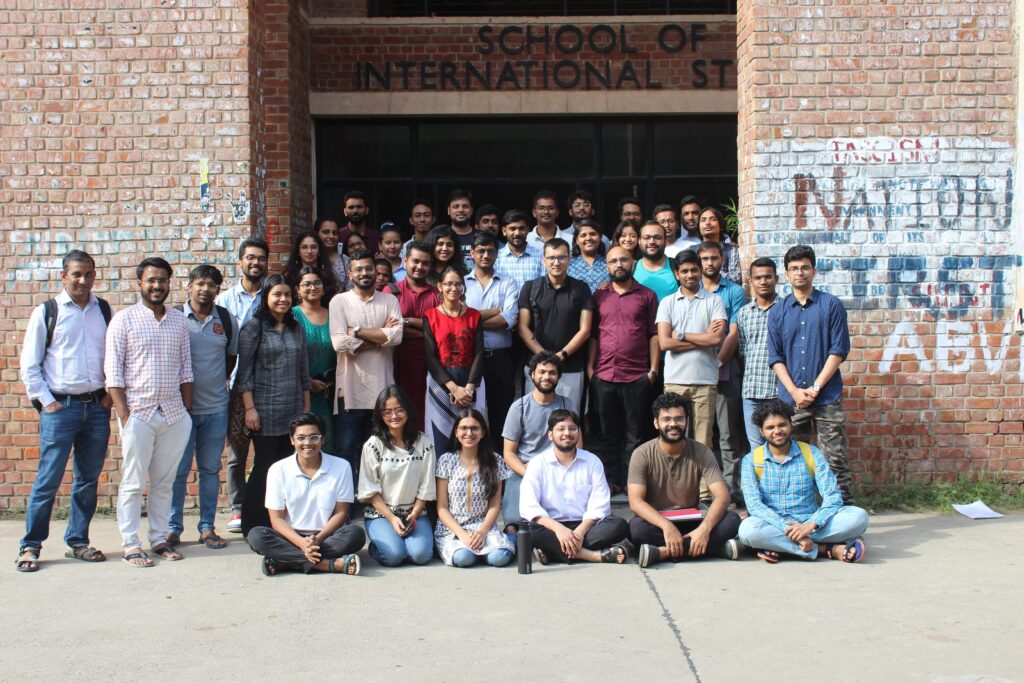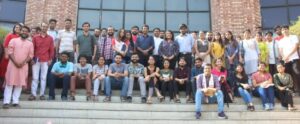
This blog provides the transcript of Candid Chat #2. Conducted on 31st July 2022, the discussion session featured Vineet Thakur, a historian of Indian foreign policy and University Lecturer at Leiden University. The conversation has been edited for the sake of brevity and clarity.
On British Raj and Indian foreign policy
There is an issue of nuance in characterizing the British Raj’s ideological underpinnings, and understanding the Indian liberals’ approach will help us better frame the question. While these liberals were not the outright apologist of the Raj, they were also not like the atypical Congress nationalists. They were occupying a middle ground of sorts. Drawing on this positioning, is there any possibility of similarly making a nuanced argument and taking a middle-ground view of the British Raj’s imperial ideology? Can we say some sincere liberal reformers were part of the British administration?
Yes, there were certainly people in the British Indian administration who were concerned about Indians. They had a messianic complex and many of them were good at heart. For instance, V S Srinivasa Sastri called Lord Irwin the uncrucified Christ. But it is important to underline that there is an imperial ideology behind all this which sought to serve the interests of a particular country. So, there is ground for nuance and it is certainly doing a disservice to history when scholars make statements like British imperialism was as bad as Nazism. Such sweeping statements do a disservice to history. To learn from history, we need to pay heed to the nuances of history and not always view history through the simplistic lens of good or bad.
In one of your papers, you argued that the most crucial foreign policy issue for the Indians in the pre-independence period was the question of racial justice and the treatment of Indians overseas. How did the perception of overseas Indians’ living conditions impact the Indian nationalists’ sense of Self at home?
Let me answer this by way of an example. The Ghadar movement that began in the US focused on two issues. First, they were concerned about the colonization of India, and the second issue had to do with the racial discrimination faced by Indians in America. Ghadar was the first movement that connected these two issues. They argued that Indians were discriminated against abroad because they were colonized at home. Even though the Ghadar movement failed to realize its goals, it galvanized the Indian nationalists. The Indian National Congress itself was radicalized because of how Indians were treated outside India.
Moreover, after the First World War, if you look at the speeches Indians made abroad, they argued that how they were being treated had to do with the question of izzat (pride). Indian liberals argued abroad that even if Indians were treated unequally at home, they should be treated abroad as equal members of the empires. The failure of the empire lay in the fact that it was unable to grant equal status to Indians outside of India. So, in a way, internal movement and external movement were connected. The external movement insisted that the question of izzat was instrumental in shaping the contours of the internal movement.
If you look at the conduct of Indian nationalist figures, there seems to be an element of hypocrisy on the issue of justice and discrimination. On the one hand, they were talking about the need for emancipation, fighting against discriminatory behavior, and advocating racial equality. On the other hand, they reflected their casteist bias when it came to the issue of overseas Indians’ conditions. How do you square the circle?
There is no way to square the circle. They were casteists and also racists against Africans. Indian arguments for racial equality on international platforms were mostly about the sovereign equality of India, not so much about racial equality at a human rights level. They argued that Indians, being an equal part of the Commonwealth, should be treated exactly the same way as Australians and other members of the Commonwealth. The rhetoric was largely about racial equality but the grounding of the argument was about sovereign equality. India, at that time, was an anomalous actor, internationally recognised but domestically colonized. They argued that Indians should be treated exactly as people in white dominions were treated.
On the question of casteism, I came across a document a few years ago in which B.N. Rau, India’s then Permanent Representative to the UN, explained to the South African diplomat at the U.N. the cause of discrimination against overseas Indians. Rao’s casteist explanation went that they [South Africans] didn’t receive the good stock of Indians but got these “coolies”. Rau suggested that South Africa should, in principle, allow some Indians to come to South Africa without facing any discrimination under a limited quota system. India, in turn, would ensure that the emigrants were of good ‘stock’. This way, the whole accusation of racial discrimination will fall apart. Rau advised that allowing some upper caste Brahmins entry would prove that Indians at large were not being discriminated against as a race by South Africa but that there were other criterions regulating entry. Gandhi, too did something similar while leading a movement in Transvaal.
Doing IR Theory
What does IR theory miss when it excludes Africa? What can Africa do to contribute to IR?
Actually, IR theory does not miss Africa. Africa has always been there. It gets reflected in the ideas of Morgenthau and Waltz. Morgenthau called Africa a “dark space”, and Waltz used examples from Africa. Most of the story of conflicts in IR comes from Africa. The continent is shown as having a dark and evil presence in IR. On the question of what Africa can do, I would say it is something Africa has to decide. We can’t sit here and answer that.
What do you make of the ongoing conversation on the need for the Indian IR theory? Do you see any merit in the idea?
I don’t feel comfortable with the notion of the Indian IR. Arguing for the Indian IR will raise a further set of questions. Who do we consecrate as an Indian? Are we saying that Indians think differently? Similarly, I am not a fan of global IR because I don’t see what they do differently. There is no methodological nuance that it has to offer. They just happen to rip off from post-colonialism. Global IR mostly ends up being a branding exercise adding little value to the discipline.
What do you find most exciting about doing the IR scholarship?
Being an infant discipline, IR is not rigid and hence it gives a wider scope for the researcher. It does not limit the researcher to any theories, ideas, or themes, and there is ample space to be eclectic. It gives one the opportunity to read as widely as possible. However, the disadvantage is that it is far less developed, still very primitive in its debates, and trailing behind most of the other disciplines in social science. A lot of scholarships hailed as innovative in IR are just derivatives from other disciplines.
Critical IR and the Politics of Knowledge Production
How to minimize, if not eliminate, our ideological biases from creeping into the research?
There is no way to eliminate ideological bias, so a better practice would be to be upfront about it. However, that does not mean discounting another point of view. For example, even if one is writing from a Marxist point of view, one must consider the arguments from other sides of the spectrum and criticize them. No researcher is neutral, so while it is absolutely fine to have an ideology, it is also imperative to consider another point of view and explain why one disagrees with them. And lastly, while adopting an approach or ideology for one’s work, it is important to be consistent in its application.
How do you see the issue of right-wing appropriation of critical theory, especially the decolonization debate in the Indian context? Is it the aesthetic allure of critical theory that the political right finds so appealing?
The right wing has appropriated critical theory debates not only in India but across the world. The fault line is that sometimes the criticism, indeed, essentially becomes about aesthetics, and that takes the whole politics out. It reduces everything to aesthetics. That has been a recurrent problem with critical theory. By reducing everything to aesthetics, the arguments disregard the real sorrows of the people. This is where the political right enters and is better able to connect with people at the roots.
In academia, should ideological space and legitimacy be provided for work emanating from any and every ideology?
Academia should be allowed to own up to all sorts of ideologies without any discrimination. Arguments should be evaluated on an academic basis, provided, of course, they aren’t calling for violence against one community, say like Nazism.
What is the responsibility of a scholar arguing for radical change, and how must they engage with the world of policymaking?
As scholars, while we do have a responsibility outside the text, I would also say that we are not policymakers and should not be forced to be policymakers. Sometimes, after I have written about something, people often ask me what should be done to change policy in this regard. It is, however, not the job of the academic to primarily offer policy prescriptions. It is the prerogative of the policymaker to read academic work and decide if they find something useful. This isn’t to say that academics should remain in their ivory towers. We need to be connected to our surroundings, and the argument about remaining distant from policymaking does not stand for taking part in social movements.
What are your views on decolonizing the IR curriculum?
On decolonization of the curriculum, we need to realize the issue that most of these initiatives are coming from scholars, white or non-white academics, sitting in the Global North. Decolonization has to happen not in countries like the U.K. centred just on the question of curriculum and what white kids should know about their country. It should also address the actual challenges faced by the Global South. Decolonization, thus, has to go beyond empty rhetoric and deal with structural issues like the problem of the Global South not having easy access to resources.
For example, a researcher who wants to work on the pre-independence period has to visit the British library, and even in India, resources are concentrated at Delhi-based institutions. Researchers from universities outside Delhi face problems in accessing the resources. Second, bringing in diverse perspectives is not only about including readings from the Global South. Diversification should be of people first and then course diversification will automatically follow. It is important to include students from different areas, castes, and classes, each bringing a different perspective. Lastly, the professors also have a responsibility in terms of how they teach the history of the margins.
What are your thoughts on the narrative that the Global North has lost the right to talk about the Global South? Is such a view good for knowledge production?
It might be tempting to suggest that the West needs to just shut up and listen, and this notion is certainly applicable in some circumstances, but then it could also be interpreted as restricting a scholar to the color of their skin. The Global South does need a space to be heard, but that should not require anyone else to shut up. As academics, we should all be self-reflective and aware of our positions in social and academic circles. However, no one should be told to shut up on behalf of someone else. As Chinua Achebe said, at this stage, we should not be worrying about the passport of who is telling the story, but we need to populate as many stories as possible. We should listen to everyone and then decide on their credibility.
How important is it to situate one’s arguments while doing critical theory?
It is very important to situate one’s arguments while doing critical theory. For instance, I can’t ignore the casteist underpinning of the postcolonial writings whereby all the thinkers that are picked belong to the upper caste Bhadralok social milieu. The lineage of nationalism that they draw is subaltern but still problematic. So it is important to criticize critical theory constantly.
Another thing to keep in mind for a critical theorist is the recognition that critical theory is a normative project. It has to have a certain kind of emancipation writ at the end of it. It cannot just be a methodological project of critique. This problem manifested in the case of post-structuralism, which criticized all kinds of structures, losing sight of nuance and emancipatory prospects. For instance, a critique of Hawaiian nationalism cannot be made the way one criticizes Sri Lankan nationalism. In the former case, the nationalists are trying to get a nation in the first place. So, if indigenous people are trying to get an identity, that has to be treated as a separate case rather than launching a generalized criticism against every sort of identity. Postcolonial theorists, thus, have to be always aware of the context of their arguments and the politics around them.
The Craft of History
What is the difference between history and memory?
Memorialization is part of history-making. Methodologically, we try to separate the two. However, memory is also a way to be remembered. Ashish Nandy once wrote about history’s forgotten doubles, referring to many ways society remembers the past. History is just one way to remember the past, and memory is another.
When it comes to story-telling, are historians in a much better position to tell stories than IR scholars?
While historians are doing good work, IR scholars also tend to approach issues with their own unique lens. For example, talking from personal experience, in the case of our research on the origins of IR in the form of the history of Milner’s Kindergarten in South Africa, earlier historians had written it from the perspective of the history of empire. We were, however, interested in this journal called ‘The State’, which had been overlooked by historians because they were only interested in the history of the empire. They were not interested in the people’s efforts in knowledge building, the kind of knowledge they were trying to build, and what purpose they were trying to build the knowledge for.
So, you can bring different strategies and different lenses to approach a common issue. You can ask a different set of questions from the same document. The questions that the two disciplines ask are very different. While historians are pretty good at what they are doing by noting down all the trivia, there are many gaps for IR scholars to fill. Nonetheless, IR scholars should learn from historians the art of storytelling and incorporate it into their work.
How should we go about reading archives, connecting the dots, and producing a coherent narrative based on them? What specific points should a researcher keep in mind when doing archival research?
Much like every book one reads while doing a literature review, there comes a time when information and arguments start to get repetitive. This is the point at which one starts to write. Similarly, while doing archival research to produce a story, some things keep coming up. When one discovers more and more information, one can start tracing the connection in the story. Needless to say, it is important to do preliminary research and read a critical set of documents on one’s topic before going to the archives. After the archival visit, it is advised to organize those notes, assemble them with the existing database, and repeat this process. A practical tip that I would give for archival research is to take as many pictures of documents as possible rather than reading them right there at the archive and catalog those pictures in own personal database.
(Discussion transcript by Kanchan Panday and Gautam Raj, Editing by Arvind Mohan and Sanjeet Kashyap)

